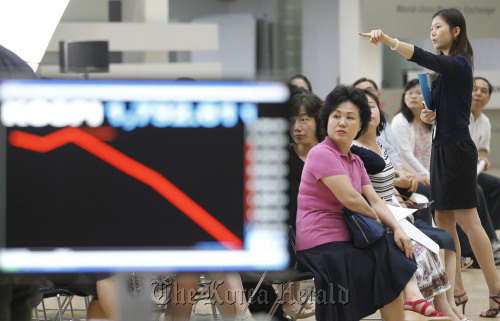Officials concerned about greater volatility from structural problems
Openness in financial markets is supposedly a positive thing. But this rule does not exactly apply to Korea’s “open” stock market that has been fluctuating in a way deemed more volatile than that of its peers in Asia and elsewhere.
Debate is raging among the country’s top policymakers over whether the Korean market is too open to external shocks and movement by foreign investors.
Openness in financial markets is supposedly a positive thing. But this rule does not exactly apply to Korea’s “open” stock market that has been fluctuating in a way deemed more volatile than that of its peers in Asia and elsewhere.
Debate is raging among the country’s top policymakers over whether the Korean market is too open to external shocks and movement by foreign investors.

Bank of Korea Gov. Kim Choong-soo blamed drastic swings in the market on the local market’s openness.
“Recent volatility in the market has increased due to a high level of openness in the Korean economy,” the central bank chief said at a news conference Thursday, shortly after freezing the interest rate.
How are open markets inferior to those which are not so open? When the country fell into deep trouble during the Asian financial crisis in the late 1990s, local policymakers were enthusiastic about reforming the system into an “open” one that attracts more foreign investors. The foreign press had depicted the Korean economy as “opaque,” and therefore unappealing to non-Korean investors who tended to shun uncertainty-laden markets.
Questions over the virtue of openness stem partly from the fact that Korea has so far done its homework, perhaps too vigorously. Although local regulators have just installed new restrictions such as a ban on short sales on the stock market in the wake of the global equity freefall, Korea’s overall financial market is widely rated as open and transparent.
Fewer restrictions on fund transactions in Seoul mean that the local market’s liquidity level is high; therefore, Korea’s stock market suffered far greater losses compared with other Asian bourses in the past month.
According to Nomura Securities, foreign funds accounted for 31.0 percent in the Seoul stock market as of end-June this year, the second biggest after Taiwan with 32.0 percent of foreign capital invested in its bourse.
The solution is to reduce dependence on external factors, nurture domestic demand and help homegrown financial companies strengthen their competitiveness. Samsung Economic Research Institute said the Korean government should curb short-term speculative funds in cooperation with other countries and push local financial firms increase their capabilities. Korea’s foreign reserves of $311 billion, ranked seventh in the world, are not enough as its proportion to gross domestic product stands at 36 percent while the average in Asia is 65 percent.
Another aspect to consider is that Korea depends heavily on exports for its economic growth. Any fluctuation in its export markets including the U.S., which is now struggling to get its fragile recovery back on track, could have a strong impact on the economic conditions in Korea.
A closer look at foreign investment in the stock market here also suggests a new direction is needed, particularly boosting the stock holdings by other Asian countries rather than by the U.S. and other developed nations.
The financial regulator’s data show that, as of end-July, U.S. funds account for 39.2 percent in the total foreign stock holdings, followed by Britain (10.2 percent). In contrast, Asian countries combined keep a 13.5 percent share in the Korean stock market.
By Yang Sung-jin (insight@heraldcorp.com)


















